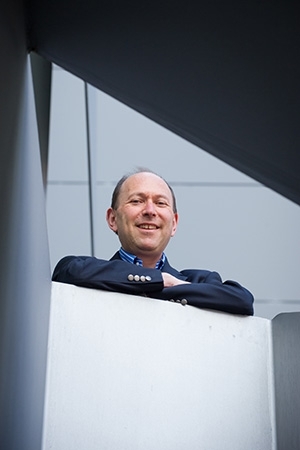Pioneering psychiatrist explores new pathways
Research news
Psychiatry has come a long way since the days of the asylum, but there is still much unknown about mental health disorders and the best ways to treat them.
Over the past 75 years, psychiatric disorders such as bipolar disorder, depression and schizophrenia, have tended to be treated with one main pharmaceutical approach, targeting chemical messengers or neurotransmitters in the brain.
However, efforts by a pioneering psychiatry researcher at Deakin are set to add a powerful new treatment option to the field.
With almost 30 years of research experience behind him, Geelong-based Alfred Deakin Professor Michael Berk has discovered a treatment approach that has the potential to improve the quality of life of thousands of people around the world.
“We have been working on developing treatments, particularly through use of the naturally occurring amino acid N-acetylcysteine, that are beginning to be used globally to help people with a range of psychiatric disorders, including schizophrenia, bipolar disorder and depression,” he said.
In recognition of his life-time achievements in brain and behaviour research – including over 700 published papers – Professor Berk has just been awarded one of the world’s most prestigious psychiatric research awards – the 2015 Colvin Prize for Outstanding Achievement in Mood Disorders Research.
The award will be presented by the US-based Brain and Behaviour Research Foundation in New York on 23 October.
The Colvin Prize marks the third milestone for Professor Berk in a few weeks. He has just become one of five Deakin researchers to be ranked among the top one per cent of researchers in their fields by the international Thomson Reuters ranking system, which is based on academic journal citations – the first time Deakin has had a staff member with this ranking.
He has also been elected a Fellow of the highly prestigious Australian Academy of Health and Medical Sciences, of which the patron is pre-eminent scientist Sir Gustav Nossal.
Since he made the move to Geelong to join Deakin’s new Medical School in 2011, Professor Berk has played a key role in putting psychiatry research at Deakin on the map. He has both strengthened his own international reputation and established, as Director, Deakin’s Strategic Research Centre for Innovation in Mental and Physical Health and Clinical Treatment (IMPACT).
“It is fabulous to be part of a rapidly growing, flexible and incredibly supportive university,” said Professor Berk. “Being part of Deakin has been a major facilitator of our success.”
IMPACT is based at Barwon Health, at the centre of Geelong’s clinical health precinct. It supports around 50 researchers and students, focussing on chronic disease patterns, risk factors and novel therapies for psychiatric, musculoskeletal and metabolic disorders, including the link between physical and mental health.
Of his several research interests, Professor Berk thinks his discovery of the potential of the drug N-acetylcysteine has the greatest promise for improving psychiatric treatment. The drug has been used by the medical profession since 1968, primarily for treating paracetamol overdose and lung conditions.
It wasn’t until 2011 that Professor Berk discovered its effectiveness in psychiatry.
“Until now, pharmacological treatment has focussed on improving neurotransmitters, which are the brain’s chemical messengers. These chemicals, such as serotonin and dopamine, are needed for nerve cell connections, but our research at Deakin has shown that they are only part of the story. Reducing inflammation, as well as improving the balance between the brain’s oxidants and its natural defence system (antioxidants) can reduce symptoms for many people,” he said.
“N-acetylcysteine targets oxidation and inflammation in the brain. This is a totally different set of targets for drug treatment of these disorders. However, we have found that targeting these pathways can significantly reduce symptoms."
“We have completed two major research projects, which is an excellent beginning. Once our findings have been replicated by other research groups around the world, we will have the evidence needed for these treatments to become widely available.”
As to what motivates him in his prodigious efforts to break new research ground, Professor Berk said “improving treatment that makes a difference to people.”
“I have always found this area of research fascinating. It asks fundamental questions about life and how people behave,” he said.
Share this story
 Making an IMPACT - Alfred Deakin Professor Michael Berk.
Making an IMPACT - Alfred Deakin Professor Michael Berk.
